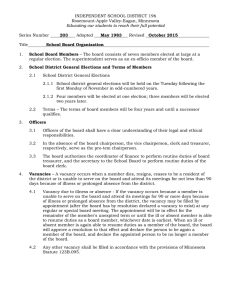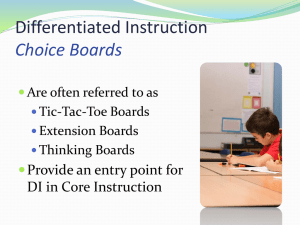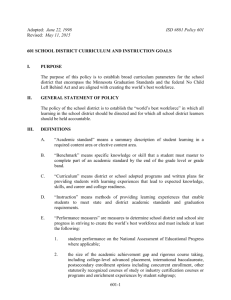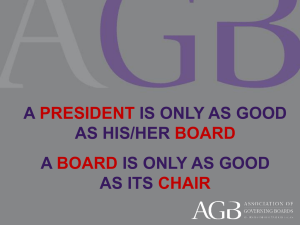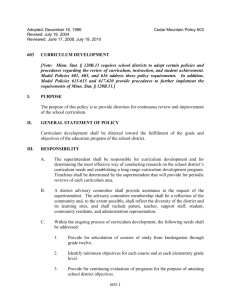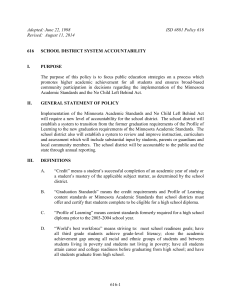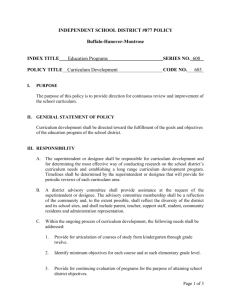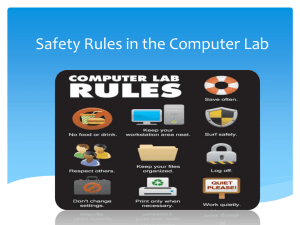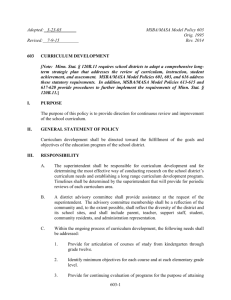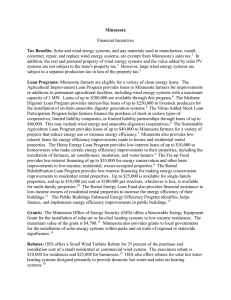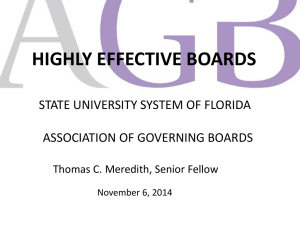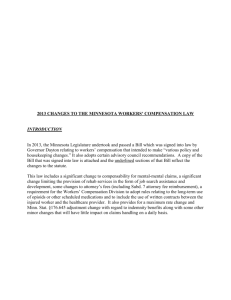Running for the School Board
advertisement
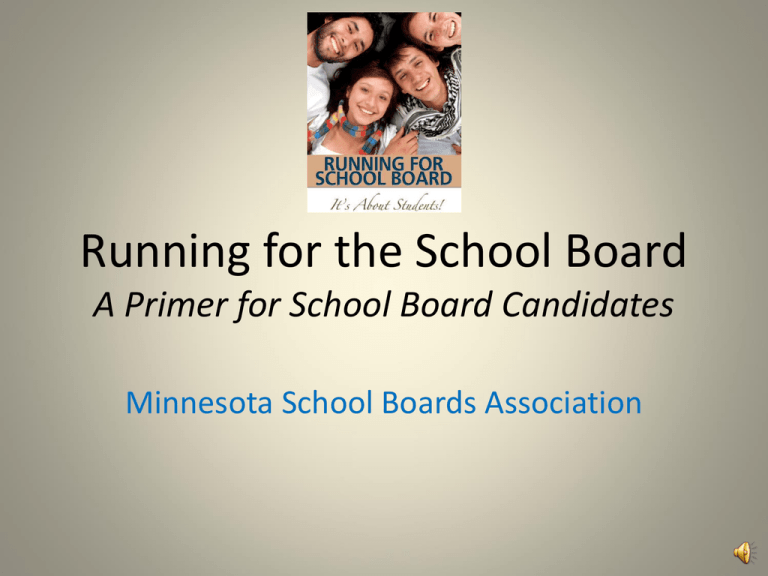
Running for the School Board A Primer for School Board Candidates Minnesota School Boards Association Minnesota School Boards Association (MSBA) • Is the professional organization for Minnesota’s publicly elected school boards • Is a non-profit, voluntary organization – founded in 1920 • Offers a variety of services for school boards and school districts – legislative, policy services, board development, superintendent search • Is a primary provider of professional development for school boards 2 What is a School Board? • A body of locally elected individuals who represent the communities they serve – Whose power and authority are granted to school boards by the state – Whose purpose is to ensure effective, efficient, and equitable delivery of high quality education to all the school district’s students through adoption of policy – Whose important task is to hire, direct, and evaluate the superintendent 3 Should I Run? • Why do you want to run? – Are you concerned about more than a single issue? – Are you concerned about the greater good? – Are you interested in solving problems? – Do you want to be a member of a team? • If not, why are you running? 4 How to Become a Candidate • School board members are elected during the November General Election on either odd or even years. Terms are for four years, and at least three members will be on the ballot during each election. Most school board members are elected at-large. • A primary must be held if a school district has approved a resolution to be part of the primary election system AND if more than two candidates file for a precinct seat, or if more than double the number of candidates file than at-large seats exist. 5 Filing for Candidacy • School districts have two filing periods – May filing for school districts with primaries – Late July filing for school districts without primaries • Candidates must file an affidavit of candidacy with the school district clerk – The filing fee is $2.00 6 Eligibility Requirements • Must be at least 21 years old • Must be an eligible voter • Must be a school district resident for at least 30 days prior to election • Must not be a convicted felon whose civil rights have not been restored • Must not earn more than $8,000 per fiscal year as a district employee 7 Financial Reporting • Whenever a campaign has either received or spent $750, it triggers a requirement for candidates to file a campaign finance report. • All candidates – no matter how much money is raised -- must file a final campaign financial report seven days after the election. 8 Powers of School Boards Provided by Minnesota Law • Care, management and control of school district affairs. The school board is charged with the care, management and control of the affairs of the school district and consists of six members elected to four-year terms and a seventh member if so approved by the voters of the school district. (Minn. Stat. § 123B.09, Subd. 1.) • Powers. The board must have the general charge of the business of the district, the school house, and of the interest of the schools thereof. The board’s authority to conduct the business of the district includes, implied powers in addition to any specific powers granted by the legislature. (Minn. Stat. § 123B.02, Subd. 1.) 9 Powers of School Boards Provided by Minnesota Law • Rules-making, management responsibilities of the School Board. The board must superintend and manage the schools of the district; adopt rules for their organization, government, and instruction; keep registers; and prescribe textbooks and courses of study. (Minn. Stat. § 123B.09, Subds. 7. and 8.) • Superintendents. School districts maintaining a secondary school must employ a superintendent; the superintendent is an ex officio, non-voting member of the school board. (Minn. Stat. § 123B.143, Subd. 1.) 10 Powers of School Boards Provided by Minnesota Law • General Powers of School Boards. The school board issues bonds with voter approval; levies taxes; hires and discharges employees; contracts for services; purchases facilities and equipment; and lots more (furnishes school lunches, removes unauthorized vehicles, operates a wind energy conversion system, offers reward, authorizes use of credit cards, for example.) (Minn. Stat. § 123B.02.) 11 Fundamental Roles of School Boards • School boards are most effective when they focus on the big picture: – Making policy – Setting goals – Engaging stakeholders • School boards hire, direct, and evaluate the performance of a superintendent who handles the day-to-day management of the school district 12 The Work of the School Board • • • • Developing a vision for the school district Setting goals and monitoring progress Establishing school district policy Hiring, directing, and evaluating the superintendent 13 The Work of the School Board • Attending training in governance and education issues • Aligning resources with goals • Collaborating with community partners • Ensuring facilities are safe and adequate 14 The Work of the School Board • Communicating with stakeholders • Monitoring student achievement • Approving collectively bargained employee contracts • Advocating student needs to lawmakers 15 What Qualities Make a Good School Board Member? Outstanding school board members are: • • • • Motivated by the best interests of all students Passionate about public education Able to make difficult decisions Strong communicators, who are willing to listen 16 What Qualities Make a Good School Board Member? Outstanding school board members are: • Believers in the democratic process • Willing to spend time and energy on school board business • Committed to governance training • Able to function as a team member 17 The Ultimate Elected Volunteers School Board Members: • Are concerned with the welfare of all children • Are part of a school board team that has oversight of school district decisions • Attend required training • Are held to a very high ethical standard 18 Know the Law • School board meetings are subject to the Open Meeting Law (Minn. Stat. § 13D.05) – Public entities must do business in the open unless a statutory exception allows a closed meeting – The public has the right to observe open meetings – Public participation is determined by board policy – Special meetings must be officially posted – A quorum of school board members must be present 19 Know the Law • Data privacy laws (Minn. Stat. § 13 and Federal Law) – School board members need to maintain the privacy or confidentiality of certain types of data – Some of the laws provide significant consequences for wrongful disclosure 20 Public Records • Data in all forms however stored (paper or electronic) • E-mail communications – Are recoverable – School board members should use separate school district-provided e-mail addresses for school board correspondence – See if the school district can archive school board members’ e-mails • School board members should follow school district policy 21 School Board Member Code of Ethics • • • • • • Be prepared for and attend board meetings Focus on student achievement Focus on the greater good Represent all stakeholders Support the decision of the school board Follow school board code of ethics policy 22 Remember • School board members have power only when sitting together at the board table – You are 1 of 6 or 7 board members • Respect the school district’s chain of command • A successful school board must function as a team with clear strategies and goals 23 Professional Development • School board members are required to receive training in school finance and management (MSBA’s “Phase Orientation Series”) • Finance and management training is developed by MSBA in consultation with the Minnesota Department of Education (MDE) 24 What Can You Do to Be Ready to Join Your School Board Team? • Meet with the superintendent and school board chair to learn about the expectations of school board members in your school district • Start attending board meetings, if you haven’t already done so 25 Thank You! • Elected school board members can call MSBA any time • Minnesota School Boards Association 1900 West Jefferson Ave. St. Peter, MN 56082 • www.mnmsba.org • 507-934-2450 or 800-324-4459 26
